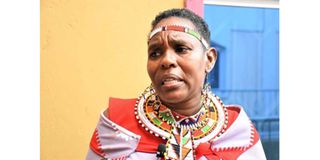Lower nomination fees for women to boost bids

Samburu Women Trust Director Jane Meriwas during a forum for women leaders from 14 ASAL counties in Isiolo town on February 7, 2022. They asked political parties to lower nomination fee for women aspirants to encourage more to vie in efforts towards realisation of two-third gender rule.
What you need to know:
- Aspirants often lament the immense financial resources needed to register for nomination and mount serious election campaigns.
- Gender experts are hopeful that the move to reduce charges will help increase the number of women making it to the ballot and winning seats.
Inadequate financial resources have been blamed for the low number of women in political leadership.
Aspirants often lament the immense financial resources needed to register for nomination and mount serious election campaigns.
Grace Kanya, a Kasarani MCA aspirant, for instance, told Nation.africa that high nomination fees and huge campaign resources stand in the way of many women who are interested in elective politics.
“As women aspirants, we have the vision but lack the resources. The nomination fees for many parties are too high for us, considering most of them are first-time contestants. Campaigns in this country are just overly expensive,” said Ms Kanya.
A fortnight ago, women from 14 arid and semi-arid counties prevailed upon political parties to lower the nomination fee to encourage them to seek elective seats.
The aspirants, who attended a mentorship forum organised by Samburu Women Trust (SWT), noted the move would also help realise the elusive two-third gender rule. They complained that huge nomination fees were locking many women out of elective politics.
The women included those who unsuccessfully contested in the 2017 election and this year’s aspirants. They said most of them could not raise the huge amount parties require as they have limited access to and control of resources.
SWT director Jane Meriwas said political parties should offer women an opportunity to vie by making nomination fees affordable. The forum brought together female leaders from Baringo, Wajir, Turkana, Kajiado, West Pokot, Garissa, Mandera, Marsabit, Isiolo, Tana River, Laikipia, Elgeyo-Marakwet and Narok.
Partial solution
The complaints about resources could be partly solved by the move by political parties to lower nomination charges for women. The Independent Electoral and Boundaries Commission (IEBC) has given parties until May 26 to conduct nominations and submit successful names.
United Democratic Alliance (UDA), which is associated with Deputy President William Ruto, for instance, early this month announced it had slashed the nomination fee for female aspirants and people living with disabilities.
Hopefuls interested in flying UDA flag for different seats were required to apply by February 28. Those seeking the presidential nomination ticket were required to part with Sh1 million for men and Sh500,000 for women and youths. People living with disabilities (PWDs) had a 100 per cent waiver.
Male aspirants seeking to be governor were charged a Sh500,000 fee, while women paid Sh250,000. For the senator position, men were required to pay Sh250,000, and women and youths Sh125,000.
The party required Sh250,000 from male MP hopefuls and Sh125,000 from women and youths.
Aspirants for member of county assembly (MCA) positions were to pay Sh50,000 and women and youth Sh25,000. PWDs will be exempted from all charges.
In Tujibebe Wakenya Party, which is associated with former Kiambu governor William Kabogo, male gubernatorial aspirants seeking to get the party’s ticket will cough Sh500,000, while women will part with Sh250,000.
For senator position, male aspirants will pay Sh250,000 and female aspirants Sh125,000. Men seeking MP seats will give Sh200,000, while women will pay Sh100,000. Male MCA aspirants will pay Sh40,000, with women paying half the amount.
The Farmers' Party, led by former Transport and Infrastructure Principal Secretary Iringu Nyakera, has also announced reduced charges for women aspirants.
Men vying for governor are required to part with Sh250,000 and women Sh150,000. Male aspirants for senator will pay Sh150,000, while their female rivals will give Sh50,000. For the MCA seat, men will be required to register with Sh35,000 and female aspirants with Sh20,000.
Early this month, Democratic Party (DP) announced that it will also reduce by 50 per cent nomination fees for women and youth aspirants. The party's presidential flag-bearer Justin Muturi, who is the National Assembly speaker, said the party will also waive the charges for female aspirants who are unable to raise the money but have leadership abilities.
He was addressing women leaders from Kiambu County under the umbrella of Maendeleo ya Wanawake Organisation.
“We have consulted widely and resolved that DP shall reduce by 50 per cent nomination fee for our women seeking elective positions as well as our youth and people with disabilities,” said Mr Muturi.
Expectations
Gender experts are hopeful that the move will help increase the number of women making it to the ballot and winning seats.
Currently, of the 349 seats in Parliament, only 76 members are female, representing only a fifth of the House. According to the Constitution, Parliament should at least have 117 female members, meaning it is falls short by 41 members.
The Senate too misses the mark, with only 21 women owning seats instead of the 23 demanded by law.




